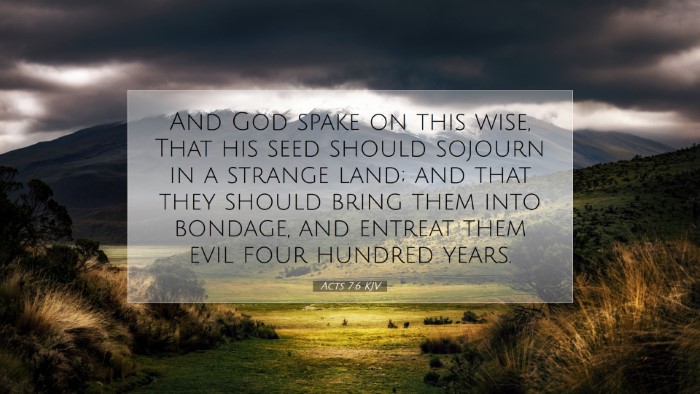Acts 7:6 Commentary
Bible Verse: "And God spake on this wise, That his seed should sojourn in a strange land; and that they should bring them into bondage, and entreat them evil four hundred years."
Introduction
This commentary explores Acts 7:6, where God speaks of the future plight of Abraham's descendants in a foreign land. The verse succinctly encapsulates a profound prophecy concerning Israel's experience in Egypt, providing vital historical and theological insights. The interpretation of this verse has been enriched through the contributions of esteemed commentators such as Matthew Henry, Adam Clarke, and Albert Barnes.
Contextual Background
To fully grasp the significance of Acts 7:6, it is essential to consider its context within Stephen's speech before the Sanhedrin. Stephen recounts the history of Israel, tracing God's promises to Abraham and highlighting the struggles that would emerge as part of God's divine plan. This specific verse references Genesis 15:13, where God foretells the 400 years of oppression that His people would face.
The Divine Pronouncement
1. God's Sovereign Plan
Henry emphasizes that God's speech reflects His sovereign plan. The designation of a "strange land" foreshadows Israel's enslavement in Egypt, which serves both as punishment for the inhabitants of Canaan and as a means of shaping His people. This period of affliction was not arbitrary but part of a broader divine strategy to fulfill His covenant with Abraham.
2. The Role of Suffering
Clarke notes that the reference to bondage necessarily implies a time of suffering but also hints at the eventual deliverance that would follow. The 400 years of hardship were meant to refine and strengthen the faith of the Israelites, preparing them for the Promised Land.
3. Theological Implications
Barnes highlights that this prophecy illustrates God's ability to foresee the future and control the events within it. He emphasizes the idea that, although God allows His people to suffer, His ultimate intention is their good, a theme consistent throughout biblical history.
The Nature of Bondage
1. Physical and Spiritual Bondage
This verse underscores the duality of bondage that Israel would experience. Physical oppression in Egypt is a metaphor for spiritual bondage to sin and the world. Henry articulates that such suffering is likened to the trials Christians face, signifying that burdens can lead to spiritual growth and reliance on God.
2. The Length of Suffering
Clarke elaborates on the significance of the 400 years, a period that symbolizes not only a literal timeline but also a duration designed by God to ensure readiness for deliverance. It serves to remind believers that God's timing is often different from human expectations. This lengthening of suffering tests faith and draws His people closer to Him.
Applications for Believers
Pastors and theologians can draw several applications from this verse:
- Hope in Trials: Just as Israel endured suffering for a purpose, believers today can find comfort knowing that trials can refine character and lead to spiritual growth.
- Faith in God’s Promises: The mention of God's promise in hardship reminds believers to hold steadfast to God’s commitments even when circumstances appear bleak.
- A Call to Perseverance: Understanding that God's timeline does not mirror our desires encourages perseverance through current struggles, fostering a deeper relationship with God.
Conclusion
Acts 7:6 serves as a profound testimony to God's sovereignty and purpose in the midst of suffering. Through the perspectives of Matthew Henry, Albert Barnes, and Adam Clarke, we see that while the prophecy foretells a challenging future for the Israelites, it simultaneously affirms God’s faithfulness to His promises. As believers study this verse, they are urged to reflect on the meaning of suffering, the nature of God's promises, and the hope that lies in His ultimate plan of deliverance.


